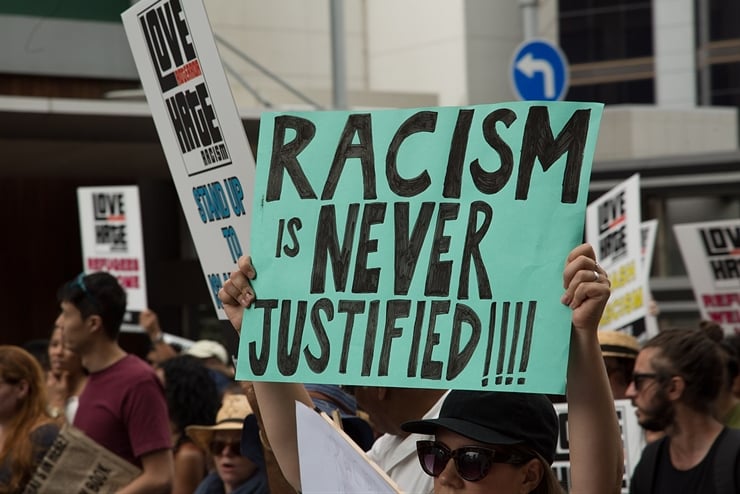While nonstop sermons aimed at whites to wash away their original sin of racism are on full throttle, spare a thought for poor old Jesse Jackson. The black activist called New York City “Hymietown” while running for president in 1984, but apologized and was forgiven by the media. Worse, he later told a reporter that if he spotted a black man walking behind him he would take defensive measures. Again Jesse was forgiven, as well he should have been, for having told an awful truth: Blacks are far more likely to shoot, mug, and rob other blacks, than whites are to shoot, mug, and rob anyone.
Out of control black-on-black crime in cities across the United States is a truth universally acknowledged, except for in the newsrooms of the usual suspects, The New York Times, Washington Post, CNN and the rest of the liberal bleeding-hearts that pollute our airwaves. Black-on-black crime is a non-story to these so-called journalistic outlets, because it does not involve the narrative of racism.
Racism is systemic only among whites, or so we’re told by above-mentioned media, as well as lefty professors and Hollywood types. The latest pearl of wisdom from the left is that a racism-free upbringing is not possible in America because racism is embedded in its culture and institutions.
Take my case, for example. I was eight years old when I first saw a black person. It was in Athens in early 1945. He must have been attached to the British Army, which had landed in Greece a couple of months earlier to repel the attempt of Communist rebels to take the capital by force. He was dressed in civilian clothes and having coffee in a popular square. I was there with a couple of my schoolmates who had never seen a black person either. My German fräulein escorting me home told us not to look at him—a rather racist thing to say nowadays. But we did stare anyway, until the black man suddenly stuck his tongue out at us, scaring us half to death. He followed up with a mock roar that sent us running away as fast as we could.
I never saw another black person until I arrived in New York a few years later. After living in the city a couple of years, I competed for my all-white school’s wrestling team against a black wrestler who happened to be blind. I was winning on points easily when my coach told me that unless I tried for the pin I would be off the team. I pinned him, and have been haunted with remorse ever since.
Was my sympathy for a young, blind, black wrestler racist? What about my childish fear of a black man sticking out his tongue at us and letting out a roar? Surely that is racist in the extreme. Actually, neither reaction has anything remotely to do with racism, but with the unknown and the unfamiliar.
In the recent past, many blacks have felt that mainstream white America considered them inelegant or unintellectual. Many working class whites felt and continue to feel the same about themselves today. This is how society has been structured throughout the ages. At present, middle-class, educated, white liberals are inventing new prejudices against lower-class whites that they once held against blacks. “It is now almost mandatory to hate deplorables,” American Conservative Senior Editor Rod Dreher observed. The most-touted Biden policy initiative, student loan forgiveness, is this prejudice in action, since it involves working class stiffs subsidizing the college debts of people who are better-off.
But let’s get back to racism and white privilege. There are school districts in America in which teachers are told that they are racists and are asked to commit to becoming anti-racist in the classroom. As Chronicles Editor Paul Gottfried wrote in last month’s issue, “Whites run to express support for BLM and even sponsor lectures and symposia that drag their own race through the mud.”
Facebook has updated its censoring algorithm to prioritize anti-black comments while making anti-white slurs the lowest priority. Hostile comments against “men,” “whites,” and “Americans” are marked “low sensitivity.” In other words, the majority is to take a back seat so 13 percent of the country enjoys a better deal. In the meantime, racism allegations now nearly guarantee front-page coverage in the Times and Washington Post, and anyone making them, no matter the absence of proof nor the dubious nature of the claim, is sure to get the benefit of the doubt.
In Europe things aren’t much better. In a recent soccer match between France’s top team and a Turkish club, the latter’s bench coach was about to be ejected by the referee when he accused the linesman who had pointed him out as “the black one” as racist. The black offender became the accuser and the game was called off. Policing what are conveniently perceived as racist remarks now take priority over real crimes like cheating, robbing, and even murder.
But imagine what would happen if a white man dared to say what Jesse did about this subject not so long ago.
Image Credit:
[Image by: John Darroch, CC BY-SA 4.0 , via Wikimedia Commons]

Leave a Reply